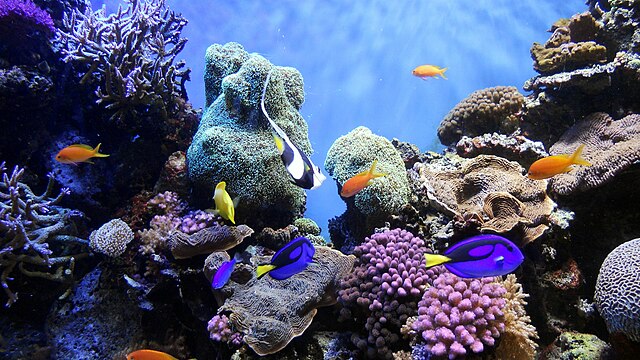How Fake Fish May Save Coral Reefs (And You Can Help!)

Coral reefs, for the most part, are out of sight and therefore, out of our minds. They are underwater ecosystems that form around colonies of corals — plant-like animals that create colonies, affixed where they are, typically in shallow waters around the world. And these reefs are at risk. According to the World Economic Forum, “scientists predict that even if global warming doesn’t go beyond 1.5C above pre-industrial levels, up to 90% of coral reefs might disappear by 2050, due to prolonged ocean heat waves. Warmer water temperatures can result in the phenomenon known as coral bleaching. This is when corals lose the algae called zooxanthellae living in their tissues, causing them to turn completely white.” And this is bad — as the World Wildlife Foundation explains, “coral bleaching matters because once these corals die, reefs rarely come back. With few corals surviving, they struggle to reproduce, and entire reef ecosystems, on which people and wildlife depend, deteriorate.”
Some blanched reefs are beyond recovery, but many can be reinvigorated — if we can get the fish to return to them. The problem, simply, is that the fish have no reason to return. There is no algae, so no food for the fish to eat.
The good news, though? We may be able to trick the fish.
How? By making fish noises.
Fish find food by following other fish, and often, they find those fish to follow through sound — if they hear other fish, they go to wherever those fish noises are coming from. Damaged reefs don’t have many, if any fish, so there aren’t a lot of fish sounds coming from them. But there could be.
According to Ben Williams, a Ph.D. student at University College London who studies the sounds of coral reefs, machine learning and AI may help us implement this audio solution. Per the above-linked World Economic Forum article, Williams and other researchers went to Indonesia and “four different types of reef habitat: healthy, degraded, mature restored, and newly restored. Each type of reef generated a different sound, depending on the amount of coral cover and the sea creatures living and feeding in the area. The team then trained a machine-learning algorithm to detect the different kinds of coral recordings — with their subsequent tests showing that the AI tool was 92% accurate in identifying reef health.” If we can replicate the sounds of healthy reef ecosystems, maybe we can get fish to return to degraded ones and restore the coral reefs to their once vibrant glory.
That’s a big task, though, because the computers need seed data — the machines need us to tell them what the fish sound like. Danny Lewis (no relation, although he and I have swapped emails before), a reporter and audio producer for the Wall Street Journal spoke with Williams. Per the tastefully named WSJ staffer, “going through hours of recordings still takes a lot of work. And for the most part, I’m listening to people talking. I’m not trying to identify fish. That’s like trying to pick out an individual voice from a recording of a crowded party in a big echoing banquet hall while everyone is moving around and talking over each other, and also, they’re eating and drinking the whole time.” Williams told Lewis that a colleague of his, “in the space of a week, managed to analyze about four hours of audio,” listening and re-listening to clips that were only a minute or two long at a time. And researchers have hundreds of hours of audio recorded — with more to come. On top of that, the error rate from having only one analyst review each recording is incredibly high; you really need a large team to look through (listen through?) the clips to build a reliable model so the computers can do the rest of the work.
The really good news? You can help! In April of 2023, Google introduced a tool that lets anyone with an Internet connection (and headphones or speakers) listen to reef sounds to help identify fish noises. If you want to give it a try, just click that link — and get ready to listen for some fish. Your results will help filter the sounds so that the machines can take over, and hopefully, mimic fish often enough to make the coral reefs thrive again.
Bonus fact: The fall of the Soviet Union may have helped save the coral reefs off the shore of Cuba. Starting in the early 1990s, the health of the reefs in the area suddenly rebounded. As Pacific Standard reports, one research team’s “working hypothesis is that the preservation of Cuba’s coral reefs is partly due to the abrupt collapse of the Soviet Union in 1991. Prior to that time, the USSR had heavily subsidized sugar production in Cuba, but, after its collapse, agricultural policies on the island shifted radically. In particular, the use of synthetic fertilizer dropped. In other parts of the world, fertilizer runoff has been a major contributor to reef decline.”
From the Archives: The Tropical Toilets We Love to Visit: You’ll never look at white sand beaches the same.
